Herman Parker Jr
b. March 27th, 1932 in Bobo (Mississippi)
d. November 18th, 1971 in Blue Island (Illinois)
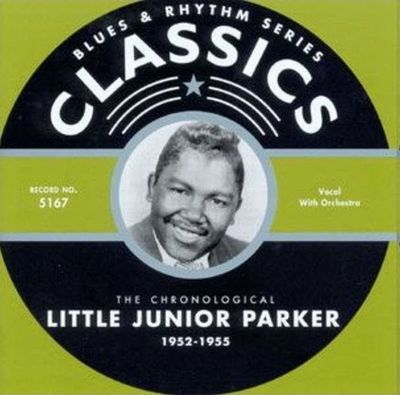
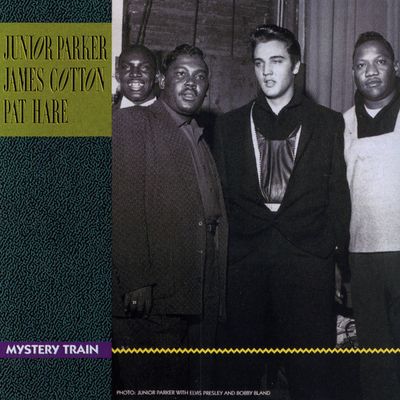
CHRONOLOGICAL LITTLE JUNIOR PARKER
Classics
January 1952 - February 1955
MYSTERY TRAIN
Rounder
June 1953 - March 1954
Fils de Willie et Jeremester Parker, le jeune Herman est initié à l'harmonica par son idole "Sonny Boy" Williamson. Adolescent, il tourne d'ailleurs à ses côtés dans le sud des Etats Unis gagnant le surnom de Junior. En 1947, après cette précieuse expérience, il entre dans l'orchestre d'Howlin' Wolf avec lequel il joue quelques temps. Toujours basé dans la région de Memphis, Junior forme les Beale Streeters qui joue du blues dans le style californien qu'il adore. Peu après, il forme les Blues Flames avec d'excellents musiciens comme les frères guitaristes Floyd et Matt Murphy. Ils sont découverts par Ike Turner et enregistrent un premier simple en janvier 1952 ("You're my angel", "Bad woman bad whiskey"). Turner revend les morceaux au label Modern des frères Bihari. Pendant l'année 1953, pour Sam Phillips et son label Sun, Junior enregistre une série de chefs d'oeuvre remarquables de pur blues comme "Love me baby", "Fussin' and fightin' blues", "Mystery train", "Feelin' good", "Feel so bad". Alors qu'il tourne avec le spectacle itinérant Blues Consolidated, il est embauché par Don Robey pour enregistrer sur son label Duke.
Son of Willie and Jeremester Parker, young Herman was introduced to the harmonica by his idol “Sonny Boy” Williamson. As a teenager, he toured alongside him in the South earning the nickname Junior. In 1947, after this valuable experience, he joined the Howlin' Wolf orchestra with whom he played for some time. Still based in the Memphis area, Junior formed the Beale Streeters who played blues in the californian style that he loved. Shortly after, he formed the Blues Flames with excellent musicians like guitarist brothers Floyd and Matt Murphy. They were discovered by Ike Turner and recorded their first single in january 1952 ("You're my angel", "Bad woman bad whiskey"). Turner sold the tracks to the Bihari brothers' Modern label. During 1953, for Sam Phillips and his Sun label, Junior recorded a series of remarkable masterpieces of pure blues like "Love me baby", "Fussin' and fightin' blues", "Mystery train", "Feelin' good", "Feel so bad". While touring with the traveling show Blues Consolidated, he was hired by Don Robey to record on his Duke label.
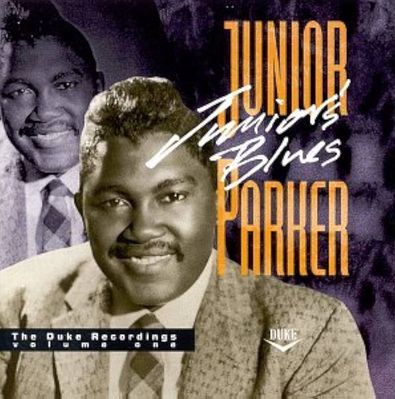
THE DUKE RECORDINGS vol.1 : JUNIOR'S BLUES
MCA
June 1954 - 1964
THE DUKE RECORDINGS vol.2 : BACKTRACKING
MCA
December 1953 - August 1966
Pour le label Duke de Don Robey, Junior Parker joue dans un style plus proche du blues californien. Il enregistre, substantiellement, entre décembre 1953 et août 1966, son blues élégant et décontracté où brillent sa superbe voix et son jeu d'harmonica. Son oeuvre pour Duke se situant à mi-chemin entre Memphis Blues et West Coast Blues. Derrière lui, on trouve souvent l'excellent guitariste Pat Hare puis Roy Gaines, "Lefty" Bates, Clarence Hollimon ou Wayne Bennett. Les premières séances débouchent sur des titres fabuleux comme "Please baby blues", "Dirty friend blues", "Can you tell me baby", "Backtracking", "I wanna ramble". Par la suite, même si Junior s'éloigne parfois du blues, on peut citer plusieurs titres marquants "You're on my mind", "I'll forget about you", "Driving wheel", "Stranded", "Sitting and thinking", "Mother in law blues", "Tin Pan alley". Après 1962, sa mésentente grandissante avec Don Robey éloigne Junior des studios et sa carrière se retrouve dans le creux de la vague.
For Don Robey's Duke label, Junior Parker plays in a style closer to californian blues. He recorded, substantially, between december 1953 and august 1966, his elegant and relaxed blues where his superb voice and harmonica playing shine. His work for Duke is halfway between Memphis Blues and West Coast Blues. Behind him, we often find the excellent guitarist Pat Hare then Roy Gaines, "Lefty" Bates, Clarence Hollimon or Wayne Bennett. The first sessions lead to fabulous titles like "Please baby blues", “Dirty friend blues”, “Can you tell me baby”, “Backtracking”, “I wanna ramble”. Subsequently, even if Junior sometimes moves away from the blues, we can point out several notable titles "You're on my mind", "I'll forget about you", "Driving wheel", "Stranded", "Sitting and thinking", "Mother in law blues", "Tin Pan alley". After 1962, his growing disagreement with Don Robey takes Junior away from the studios and his career finds itself at a low point.
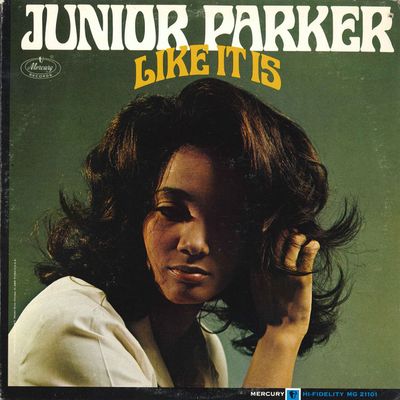
LIKE IT IS
Mercury
August - November 1966
En arrivant chez Mercury, Junior est placé sous la supervision du producteur new-yorkais Bobby Robinson et de l'arrangeur Gene "Bowlegs" Miller. Soucieux de diversifier sa musique, il mélange son Blues avec des sonorités Soul où sa voix fait toujours merveille. On peut retenir en particulier "Country girl", "Wish me well", "Hey lawdy mama", "Come back baby", "Baby please" dans ce programme honorable.
Upon arriving at Mercury, Junior was placed under the supervision of New York producer Bobby Robinson and arranger Gene "Bowlegs" Miller. Keen to diversify his music, he mixes his Blues with Soul sounds, where his voice always works wonders. We can particularly point out "Country girl", "Wish me well", "Hey lawdy mama", "Come back baby", “Baby please” in this decent program.
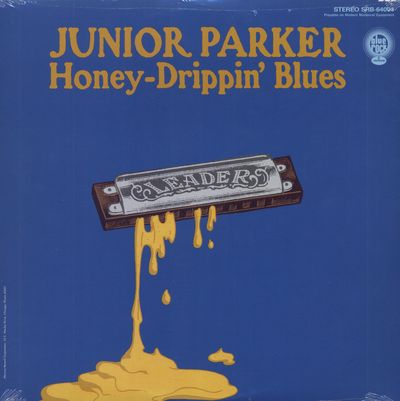
HONEY DRIPPIN' BLUES
Blue Rock
May 1967 - 1969
Cet album, paru sous la bannière Blue Rock (marque appartenant à Mercury) regroupe, en fait, plusieurs séances hétérogènes capturées entre 1967 et 1969. Celles-ci proviennent de différents studios et montrent différentes tentatives - généralement peu convaincantes - de Junior Parker et de ses producteurs (dont Huey Meaux) entre Blues, Soul et ballades.
This album, released under the Blue Rock banner (an imprint owned by Mercury), actually brings together several heterogeneous sessions captured between 1967 and 1969. These come from different studios and show different - generally unconvincing - attempts by Junior Parker and his producers (including Huey Meaux) between Blues, Soul and ballads.
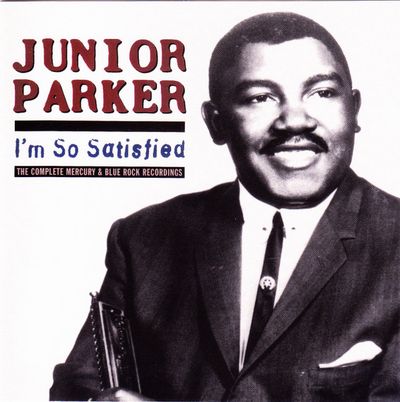
I'M SO SATISFIED
Mercury
August 1966 - 1969
Ce CD regroupe l'intégralité des enregistrements de Junior Parker pour Mercury et Blue Rock. On trouve également quatre titres inédits issus de ces séances.
This CD features all Junior Parker's recordings for Mercury and Blue Rock. It also includes four previously unreleased tracks from these sessions.
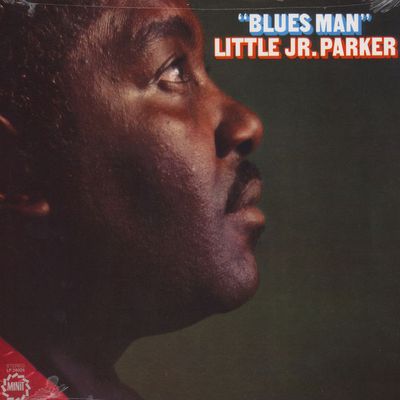
BLUES MAN
Minit
1969
Quand son contrat avec Mercury n'est pas renouvelé pour manque de succès, Junior arrive chez Minit. Il grave cet album à New York avec des musiciens non identifiés. Un programme de blues cuivré plutôt inspiré faisant la part belle aux reprises.
When his contract with Mercury was not renewed for lack of success, Junior joined Minit. He recorded this album in New York with unidentified musicians. A rather inspired program of brassy blues with an emphasis on covers.
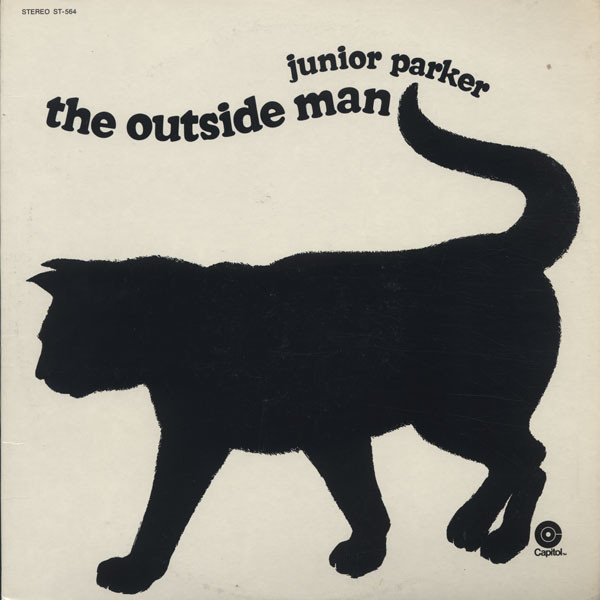
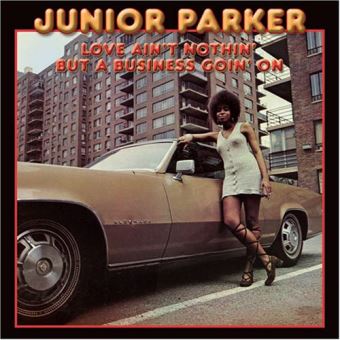
THE OUTSIDE MAN
Capitol
LOVE AIN'T NOTHIN' BUT A BUSINESS GOIN' ON
Groove Merchant
Late 1970
Sous la supervision du producteur Sonny Lester, Junior s'oriente encore plus nettement vers un son entre Soul et Pop. S'il ne joue pas de son harmonica, il garde sa belle voix mais peine à convaincre avec cette tracklist hétérogène. De manière inattendue, il reprend ici trois titres des Beatles qu'il recrée totalement. L'album est réédité par le label Groove Merchant que le producteur Sonny Lester vient de créer.
Under the supervision of producer Sonny Lester, Junior moves even more clearly towards a sound somewhere between Soul and Pop. Although he doesn't play his harmonica, he keeps his beautiful voice but his heterogeneous tracklist is hard to convince. Unexpectedly, he covers three Beatles tracks, which he totally recreates. The album is reissued by Groove Merchant label, just created by producer Sonny Lester.
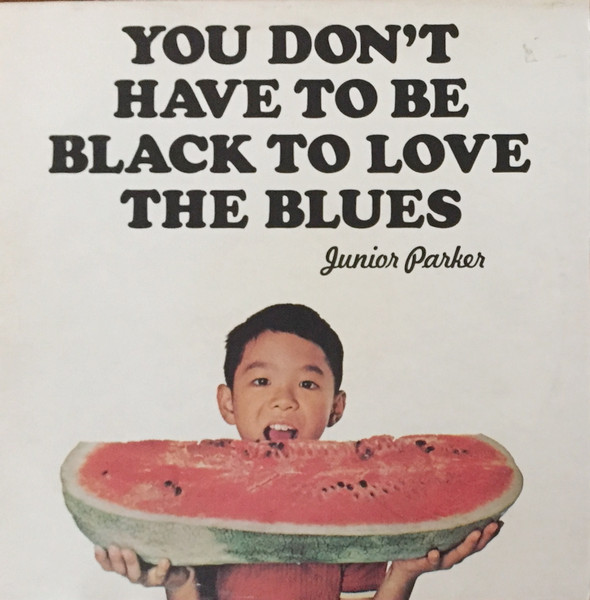
YOU DON'T HAVE TO BE BLACK TO LOVE THE BLUES
Groove Merchant
Late 1970
Cet album provient des mêmes séances produites par Sonny Lester que le précédent. Mais, cette fois Junior se concentre sur le Blues et joue de son harmonica. Si le programme ne brille pas par son originalité, il s'écoute avec plaisir et contient même de bons moments ("Blue shadows falling", "Look on yonders wall").
This album comes from the same Sonny Lester-produced sessions as the previous one. But this time, Junior concentrates on Blues and plays his harmonica. If the program doesn't shine original, it's a pleasure to listen to and even contains some good moments (“Blue shadows falling”, “Look on yonders wall”).
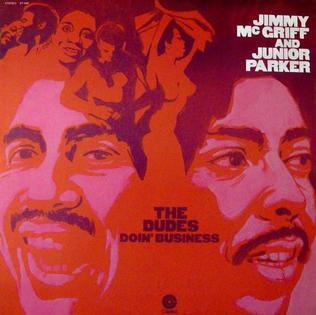
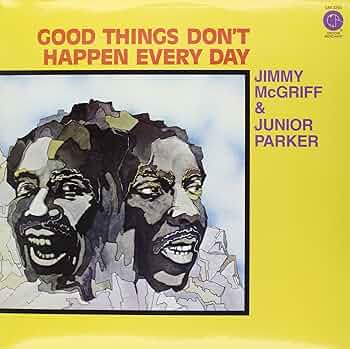
THE DUDES DOIN' BUSINESS
Capitol
GOOD THINGS DON'T HAPPEN EVERY DAY
Groove Merchant
February 1971
Toujours sous l'égide du producteur Sonny Lester, Junior Parker s'associe avec l'organiste Jimmy Mac Griff pour un album Soul-Jazz. Malheureusement, la musique manque de flamme et d'inspiration et finit par ennuyer.
Still under the aegis of producer Sonny Lester, Junior Parker teams up with organist Jimmy Mac Griff for a Soul-Jazz album. Unfortunately, the music lacks inspiration and ends up boring.
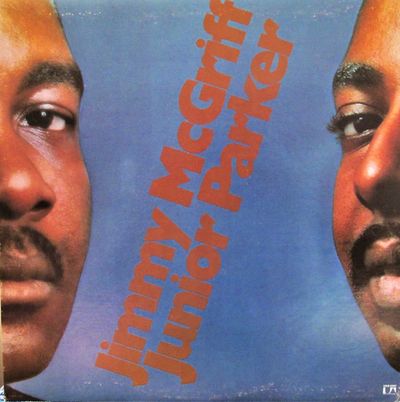
JIMMY MC GRIFF / JUNIOR PARKER
United Artists
Summer 1971
Voici une captation d'un concert au Golden Slipper de Newark réunissant Junior Parker et l'organiste Jimmy Mac Griff. Une performance dynamique plus orientée vers le Blues que précédemment. Belles versions de "Don't throw your love on me so strong", "Pretty baby" et "Five long years".
Here's a recording of a concert at Newark's Golden Slipper featuring Junior Parker and organist Jimmy Mac Griff. A dynamic performance, more Blues-oriented than previously. Nice versions of “Don't throw your love on me so strong”, “Pretty baby” and “Five long years”.
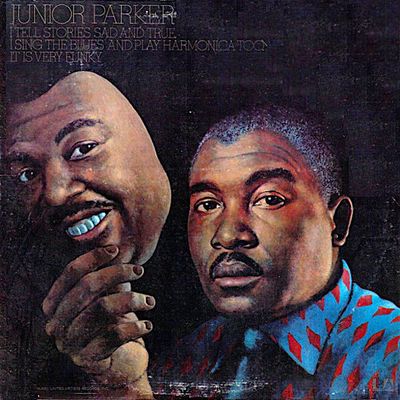
I TELL STORIES SAD AND TRUE
United Artists
August - October 1971